Nghe An steps up prevention of harassment and annoyance to people
(Baonghean) - Forced dismissal is the highest form of disciplinary action against officials, civil servants, and public employees when they commit violations during the handling of administrative violations mentioned in Decree No. 19/2020 of the Government. In Nghe An, there have been cases of officials and civil servants committing violations that have had a negative impact on the people.
New decree takes effect in March
Decree 19 on inspection and disciplinary action in the enforcement of laws on handling administrative violations of the Government takes effect from March 31, 2020. This Decree aims to contribute to preventing corruption, especially petty corruption, and to clean up the apparatus...
Accordingly, civil servants and public employees in general will be subject to disciplinary action and forced to resign if they abuse their positions and powers to harass, demand, or receive money or property from violators; condone, cover up, or restrict the rights of administrative violators when they are handled for administrative violations. In reality, such acts occur in many areas, especially in the settlement of administrative procedures; traffic and urban order management; land... and "transform" into many forms, so they are not easy to detect and handle.
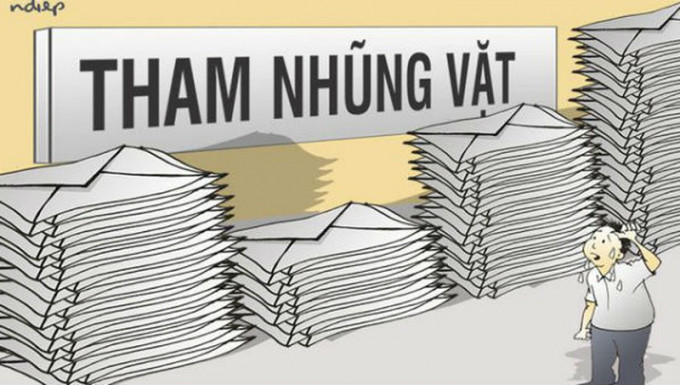 |
| Illustration photo |
In Nghe An, although not many, there have been cases of officials and civil servants engaging in similar behavior, causing negative impacts on the people. Remember, a few years ago, public opinion was stirred up by the news that Mr. Nguyen Ngoc S - former Deputy Head of the Urban Order Regulation Team of a commune in Vinh city was caught red-handed by the police while receiving protection money from 7 street vendors at his private home. At the investigation agency, this official admitted to accepting bribes for protection, not handling the street vendors who encroached on the sidewalk.
Or in 2019, there was a case where two former market inspectors of Market Management Team No. 8 (Market Management Department of Nghe An province) were prosecuted for abusing their positions and powers to appropriate property when they received 6 million VND from Mr. Vi Van Hung, a herbal medicine practitioner residing in Ngoc Lam commune, Thanh Chuong district, when they came to his house to inspect his medical practice. At the time of the inspection, Mr. Hung could not present any documents, so he gave the requested amount of 6 million VND to avoid being punished for the violation...
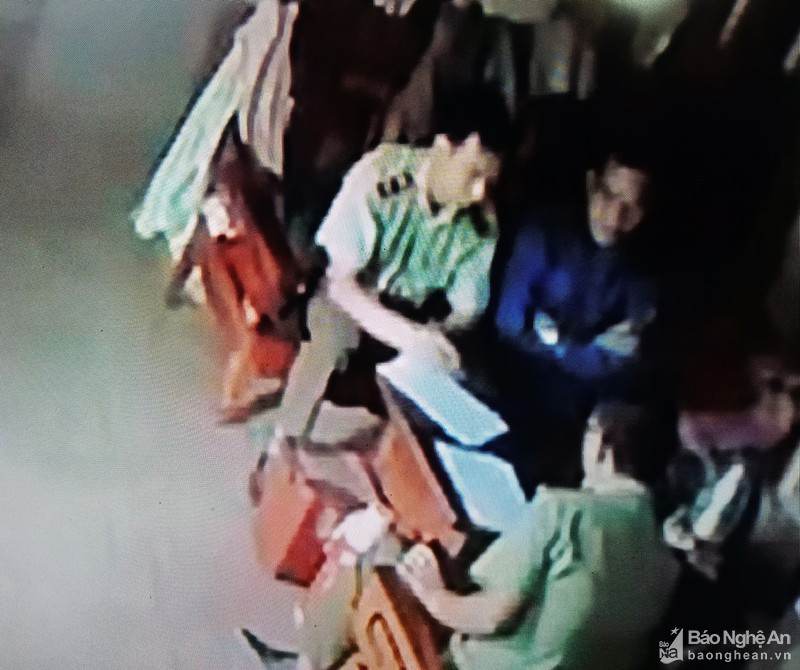 |
| Camera footage captured a group of people wearing market management uniforms coming to Mr. Vi Van Hung's house. Documentary photo |
The above incidents, though small, have significant consequences, such as “termite nests corroding the dike foot” which undermine the trust of the people and businesses in state management. At the same time, they are the cause of violations of public ethics by officials and party members.
According to Decree No. 19/2020 of the Government, the disciplinary measure of forced dismissal is also applied to the act of retaining a violation case with signs of crime to handle administrative violations; Forging or falsifying records of administrative violation handling; Threatening or repressing people who provide information and documents to inspection agencies...
At lesser levels, officials, civil servants and public employees who commit violations may be reprimanded, warned, have their salaries reduced, be demoted or dismissed. Together with the 2008 Anti-Corruption Law, Decree 19, which comes into effect, will be the “stick” for all levels and sectors to strictly handle officials, civil servants and public employees who violate public ethics, degenerate, change, self-evolve and self-transform.
Recently, the Provincial People's Committee issued Plan No. 43/KH-UBND on management of law enforcement on handling administrative violations in Nghe An province in 2020. It requires: Management of law enforcement on handling administrative violations must ensure synchronous, unified, focused and key implementation; combining management by field and by locality; inspection of law enforcement on handling administrative violations must be in accordance with principles, authority, responsibility... During the year, the Provincial People's Committee assigned the Department of Justice to preside over and coordinate with relevant provincial departments, branches, sectors, and district-level People's Committees to conduct inspections of law enforcement on handling administrative violations when there are recommendations and reflections from agencies, organizations and individuals on the application of legal provisions on handling administrative violations that seriously affect the rights and legitimate interests of individuals and organizations.
Promoting the role of "eyes and ears" of the people
In addition to tightening state management, reforming administrative procedures, promoting administrative inspection, public service inspection, specialized inspection, and surprise inspection. Thereby detecting, preventing, and strictly handling violations, especially in sensitive areas such as land, basic construction, finance, budget, etc., the Standing Committee of Nghe An Provincial Party Committee issued Official Dispatch No. 5192-CV/TU dated November 13, 2019. In which, it requested relevant departments and branches to direct the implementation of strict handling of officials and civil servants who harass, extort, and cause trouble for people and businesses in the process of handling administrative procedures; effectively preventing the abuse of positions and powers in performing duties and public services for personal gain.
Strengthen inspection and supervision of the activities of agencies and units with anti-corruption functions; strictly handle negative and corrupt behaviors during inspection, investigation, prosecution, trial, and execution of judgments; promptly replace unqualified and unethical officials...
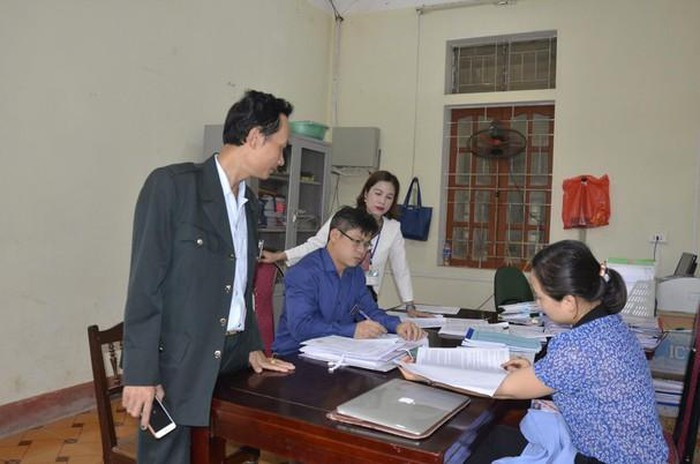 |
| The interdisciplinary inspection team inspected discipline and administrative order at the facility. Illustrative photo |
On the side of the People's Committee of Nghe An province, it issued Document No. 4702/UBND-TD dated July 10, 2019 requesting Directors, Heads of departments, branches, and sectors; Chairmen of People's Committees of districts, cities, and towns to strictly implement Directive No. 10 of the Prime Minister to strengthen handling and prevention of harassment and inconvenience to people and businesses.
The document clearly states: "Strict action will be taken against heads of agencies and units who are irresponsible and allow cadres, civil servants and public employees under their direct management to harass and cause trouble for people and businesses; and heads who show signs of covering up or condoning wrongdoings by subordinates will be immediately taken against."
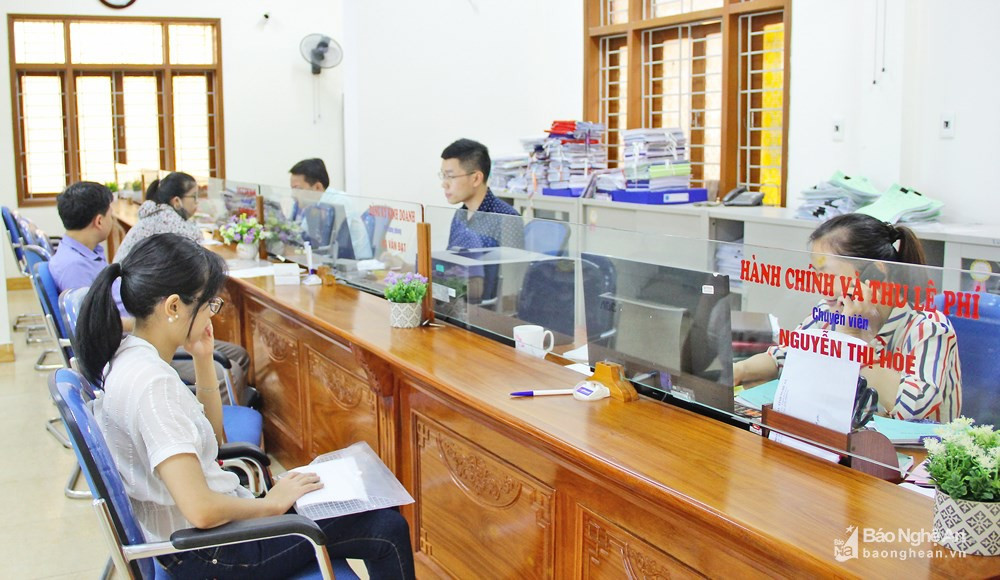 |
| Resolving administrative procedures for businesses at the Department of Planning and Investment. Illustrative photo |
In addition, the Provincial People's Committee also issued Plan No. 610/KH-UBND dated October 14, 2019 to implement the Project "Propaganda, dissemination and education of laws on corruption prevention and control for the period 2019 - 2021" in Nghe An province.
It emphasizes: "Forming a culture of transparency and accountability among cadres, civil servants and public employees in performing public duties, clearly recognizing that the act of giving, receiving and brokering bribes is a violation of the law, contrary to ethics, conscience and responsibility, building a healthy relationship between cadres, civil servants and people, firmly consolidating behavioral ethics and standards between cadres, civil servants and people.
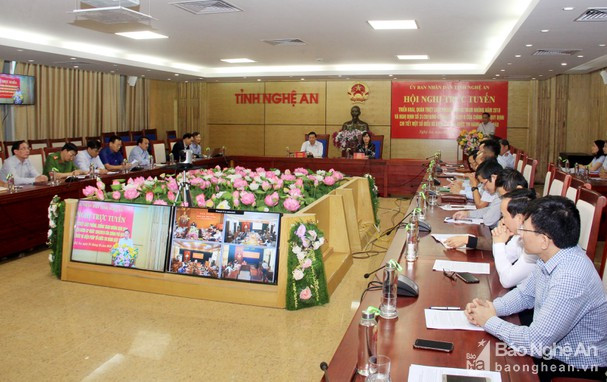 |
| Conference on implementing the Law on Anti-Corruption. Photo courtesy |
However, along with educating cadres, civil servants and public employees on ethics and integrity, all levels, sectors and localities need to have practical solutions to bring the 2018 Law on Anti-Corruption and Decree No. 19/2020 of the Government into life, spreading widely in society so that people can clearly understand and say "no" to acts of abetting wrongdoing by cadres and civil servants.
At the same time, promote the role of "eyes and ears" of the people in detecting and strictly handling officials and civil servants who harass and cause trouble for people and businesses in the process of performing public duties.
Violations in the enforcement of laws on handling administrative violations according to Decree 19
1. Retain the violation case with signs of crime for administrative handling.
2. Taking advantage of one's position and power to harass, demand, or receive money or property from violators; condoning, covering up, or restricting the rights of administrative violators when handling administrative violations.
3. Not imposing administrative sanctions; not applying remedial measures or not applying administrative sanctions to violators according to law.
4. Penalizing administrative violations, applying remedial measures or applying administrative handling measures that are not timely, strict, or not in accordance with the authority, procedures, or subjects as prescribed by law.
5. Applying incorrect or incomplete forms of sanctions, levels of sanctions, and remedial measures to administrative violations.
6. Illegal interference in the handling of administrative violations.
7. Extend the period of application of administrative measures.
8. Using money collected from administrative fines, money paid for late enforcement of decisions on imposing fines, money from selling and liquidating confiscated exhibits and means of administrative violations, and other money collected from administrative fines in violation of the provisions of the law on the state budget.
9. Forging or falsifying administrative violation records or records of application of administrative measures.
10. Providing inaccurate or dishonest information or documents related to the test content.
11. Illegally interfering with inspection activities, taking advantage of one's influence to influence those performing inspection duties.
12. Opposing or obstructing inspection personnel, threatening or repressing those who provide information or documents to inspection agencies or inspection teams, causing difficulties for inspection activities.
13. Disclosing information and documents about inspection conclusions before there is an official conclusion.
14. Do not perform the inspection conclusion.
15. Incomplete and inaccurate implementation of inspection conclusions.
16. Failure to monitor, urge, and inspect the implementation of sanction decisions by sanctioned individuals and organizations; and the implementation of remedial measures by individuals and organizations.
17. Issuing documents without authority regulating administrative violations; on authority, procedures, forms of sanctions, remedial measures for each administrative violation in the field of state management and administrative handling measures.
18. Lack of responsibility in directing the implementation of inspection conclusions.
19. Failure to resolve or failure to promptly resolve complaints and denunciations in handling administrative violations.

